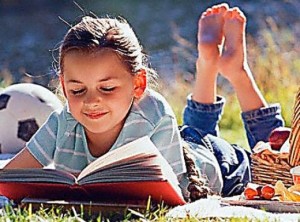Suggest that kids do any kind of school work during the summer holidays and you’re likely to be met with a whole host of objections. Children need to keep learning going over the long summer break as research shows those that don’t, fall back over the summer and take up to several weeks to get going again in the autumn term. Some schools operate summer schools to help children stay in the right frame of mind but if summer school’s not an option in your school try some of our holiday learning activities to keep them on their toes.
Activity One – Projects
Children like doing projects and if you can keep the subjects interesting and choose ones that they’ll be motivated by, you’ll find they’ll happily comply.
Some schools even lend out school equipment over the holidays such as magnifying glasses, microscopes or sets of science equipment so the children can really get into the learning at home. Often the children will come up with a topic of their own but if you make suggestions based on their interests or offer the use of school equipment then you’ll soon have them started.
Activity Two – Journals
Some children keep diaries whilst others would dread having to write an entry in a diary or journal every day. The easiest way to get a journal written is to ask the children to write about their ten, fifteen or twenty most exciting days in their holidays.
You should encourage them to plan which days they’re going to choose beginning with any that they know they’re going to be on holiday for or doing something special, then fit in other days to make up the number. You could suggest that those who don’t enjoy writing should perhaps do an annotated pictorial journal or perhaps even record or video a journal of their experiences. You could then have them presented at an early assembly in the new term.
Activity Three – Postcards
Another way to collect holiday experiences is to send postcards. Most stationers sell blank postcards on which the children can draw their own picture, write the card about their experience and send it to a classmate for them to collect on their behalf. If the child goes away during the holiday, the self-drawn cards could be replaced by one from the location they’re in.
Activity Four – Online Games
Given the chance, many kids would spend the holidays glued to their computer playing video games. Whilst this should be restricted for obvious reasons, why not compile a list of computer game websites where the games are educational, perhaps practising English or maths skills. There are plenty of free sites out there and it’s often only not knowing about them that stops the children enjoying them.
Activity Five – Story Chains
Writing stories is great fun and writing them collaboratively is even more fun. You could use email or a blog (often a better idea because you can monitor it more easily) to construct story chains. You should start the chain with a story opener and each post from the children afterwards can be a new chapter. The comments boxes for each could be for your comments or that of the following writer. The children can add illustrations easily making the finished product more appealing.
Activity Six – Vocabulary Collector
Tell the children that professional writers often carry a notebook with them to write down new words they come across to use in their stories. Ask the children to be a vocabulary collector over the summer holiday, writing down any interesting words they hear or see during the time. They should find out what the words mean and write a sentence showing how to use it. When school restarts you can encourage them to share their words and perhaps build a class vocabulary chart for the wall.
Activity Seven – Bad English Detectives
There are so many examples of bad English; spelling, punctuation and vocabulary, to be seen around. Show the children examples from the sheet that accompanies this activity pack to see if they can identify what the errors are. Say that they’re all from daily life and that they are likely to find many more.
Ask them to act as bad English detectives during their holidays and either photograph examples or write them down to bring into school after the holiday to make a ‘Bad English’ display.




